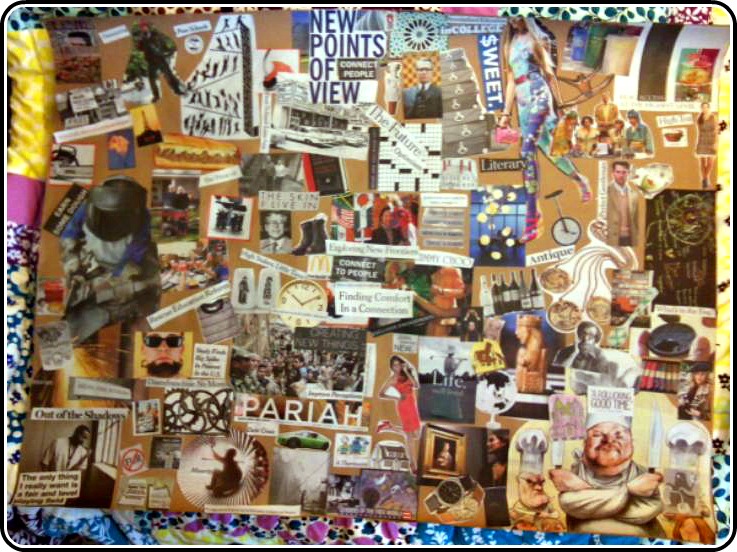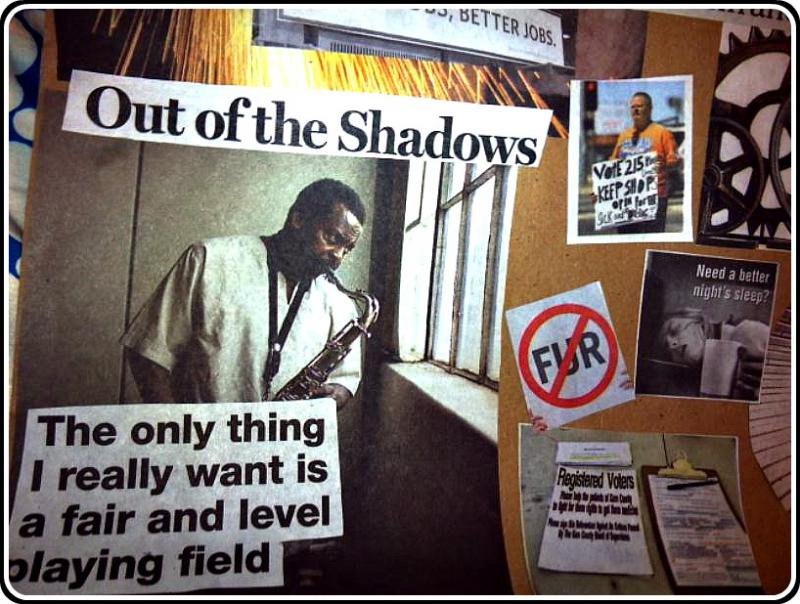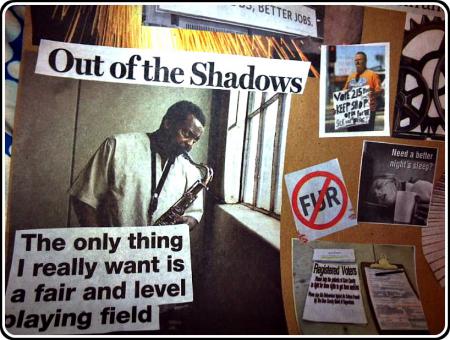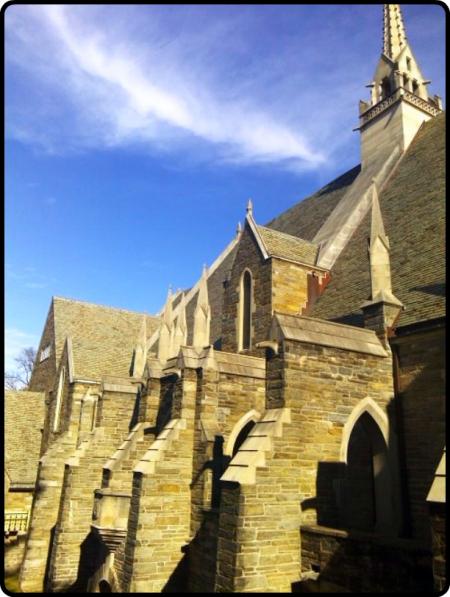Serendip is an independent site partnering with faculty at multiple colleges and universities around the world. Happy exploring!
JHarmon's blog
Reflections and Thanks
While last night's performances were really touching and funny, we all know that they went far beyond that. They showed our sense of agency to go into the world with the knowledge we've gained and actually make a change--whether that change is simply modifying how we will personally operate in the world or taking our knowledge to a broader audience through teaching, playing games, noticing bias in youtube videos, or rapping. The only thing I hope is that our efforts don't stop just because this class has. I hope we continue to keep what we've learned in our minds far beyond this class and our years at Bryn Mawr. In my group's performance, we didn't get a chance to share what Robin Kelly said, and that is that we can't change the media until we change society; and we cannot change society until we change ourselves. It is only in this sort of cyclical pattern of “making new people” that we can “make new television.”
New Points of View
Hello All,
This collage is titled “New Points of View,” and it aims to represent the various experiences and cultural capital we bring with us here to Bryn Mawr. Ultimately, social class is another form of diversity such as gender, race, or ethnicity. It shapes who we are and how we experience the world around us. However, social class is different from all of these things in the fact that the topic is alarmingly taboo. Although, like race and gender, it is something we are usually born into, we feel uncomfortable embracing it or even acknowledging its existance. This collage aims to ask the viewer whose culture has capital. Do we all have cultural capital? Whose is most important? Is anyone's cultural capital more valuable than others? Is there a way that we can acknowledge these differences rather than ignore them? And finally, how do we “bridge the gap” and learn from one another?

What differences do you see between the left side and the right side? Are these differences important? Which one more closely mirrors your experience?

What are your feelings about the American Dream? Is it attainable for everyone?

Identity Formation and Class
Hey Everyone
Here's a cool article I read last year in the New York Times called "What Is It About 20-Somethings?" It kind of piggybacks on a couple of topics we've discussed such as our mini-discussion of forming identities in this time of our lives. However, after today's conversation, my perceptions of this article changed and seem much more classed than before.
Essentially, the researcher in the article argues that there is a new stage of life similar to adolescence that happens in a person's 20's. We take a longer time to grow up and being self-actualized or find our purpose. However, what about people who can't extend their periods of self-discovery? What about those too time poor or money poor for the luxury of a few more years of "self indulgence?"
Some of these issues are addressed in the article, some are not. Overall, though, it's a good read. :)
Read On: http://www.nytimes.com/2010/08/22/magazine/22Adulthood-t.html?pagewanted=all
P.S. GOOD LUCK ON FINALS!!!!
Being Perfect
As I think about what writing “like an academic” means, I can't help but think of formality and perfection. Tied up in dense theory or personal story, the author's we read about somehow articulate their ideas in a way that I feel I never could. Their ideas are described so well that describing them any other way could never do them justice.Yes, these works have been edited, pared down, and abstracted to fit the goals of our assertions. However, in this process of editing, paring, and abstracting, how much of our voice are we deleting and muting? How much of ourselves do we take out of our own equation?
Writing Essay Number 10
One thing I have noticed about my writing overall is that it does get easier each week. While I still struggle to produce paper's I feel comfortable turning in, the process has become increasingly easier, and I find that our weekly papers have given me a great sense of growth. However, this paper was extremely challenging for me to write, and I am still unsure as to if I completed the task in the way I should have. I felt unprepared, and I wished that I could have gotten just a few more voices to place into the paper. Overall, I felt as though my paper was too representative of my own thoughts and voice, and I struggled to find a thesis out of the information I had. I also felt uncomfortable with quoting my interviewees because without "real" quotations, I was nervous about overstating things they had said.
My writing process gave me a lot of ideas as far as how to address issues of class on campus, but again, these were personal thoughts. While they were influenced by my interviewees, I wish I had put more voice of others into the paper. I definitely think that this week's writing has a lot of room for revision.
Space as Symbol
My thesis revolved around the idea of space as a symbol. Just as nbnguyen found that her desk was a reflection of herself and her personal philosophy of what an intellectual space is, I based my argument around ways that institutions reflect their values through their architecture. As time moves forward, public libraries move from being silent areas of self improvement to more collaborative areas that feature more than just spaces to study (modern libraries have computers, counseling, language classes, etc.). At Bryn Mawr, our space is a symbol of its values and aspirations of its students. I used Goodhart Hall as my example because I love its location and landscape, but the idea extends to virtually anywhere on campus. Goodhart's collegiate gothic architecture evokes a sense of upper class, power and masculinity, yet the landscape gives it a much more feminine feel. Overall, the architecture, placement, and use of Goodhart says a lot about the goals of Bryn Mawr and its students.

The Education Bubble--Harvard Business Review
Hey Everyone!
This link is just food for thought, but it points out something I think pertains to the article by Edmundson we read earlier in the semester. Justin Fox, a Harvard Business School professor, talks about the value of a college degree and how the supply of college graduates is much greater than the demand, which ultimately allows for a really horrible job market in the United States. He talks about how the cost of a degree is far more expensive than its worth in most cases today, and the possibility that this will create an education bubble that will eventually burst.
I think this can really help explain Edmundson's point about the mentality of college students today who feel tremendous pressure to perform to perfection rather than taking risks.
-"The Education Bubble, Tenure Envy, and Tuition"
Harvard Business Review
http://blogs.hbr.org/ideacast/2011/06/the-education-bubble-tenure-en.html
Reflections!
My reflection revolved around my ability to "edit" my ideas and rethink many opinions about our educational system that I once firmly believed in. Prior to being in this class, I had a strong belief that every student should go to college and those who didn't were destined to be failures. Even though I saw students who simply weren't raised to beleive college was even a remote possibility, I felt comfortable telling myself that these students simply weren't ambitious or motivated enough to reach college. Essentially, I was blaming these students for something that, in many aspects, was out of their control. Since being in this seminar, my views on the topic have changed tremendously; and I realize the adversity that disadvantaged students have in our educational system that promotes "fairness." My ability to really grapple with issues like these has been the area where I've seen the most growth in myself over the course of this seminar.


